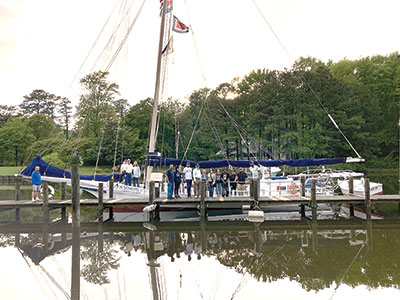
by Mary Wakefield Buxton –
URBANNA — On a stormy wintry day, March 4, 1977, just off the Honga River near Deal Island in the Chesapeake Bay, the Claud W. Somers sank in 12 feet of water with all six crew members on board. It was a tragic ending for one man’s dream.
Captain Thompson Wallace at the helm had dreamed of having his own oyster boat for many years before he was able to scrape up enough money to buy a rundown skipjack needing a lot of repairs. He was able to fix up his dream ship and went directly into the oyster business.
Tonging oysters is tough, it takes great physical strength, on top of being dangerous because of exposure to all kinds of weather. Storms kick up fast on the bay and going out in the winter months when oysters are plentiful can be particularly dangerous. Still, bills have to be paid, the crew has to be paid, we know what that’s like, and sometimes a waterman will take a risk even when a voice from within may whisper a warning, “better be careful, it’s blowing hard out there today.”
Wallace took two of his sons to work with him that day plus two other members of his family and one outsider and they made their way out in rough seas to dredge the oysters. He thought of taking his youngest son but at the last minute decided against it.
The weather wasn’t great but they managed to dredge 33 bushels of oysters before a storm kicked up with high winds. The boat sank straight down in 12 feet of water carrying crew and oysters with it.
When the Claud W. Somers didn’t get in that night, home folks expected the worst. The next morning rescue craft took off searching for her. No sign.
Finally, someone spotted a mast sticking up out of shallow water. It turned out to be the Claud W. Somers. She was still intact, even her 33 bushels of oysters were still laid out in her hold when she was lifted out of the sea.
Such a tragedy — for not only the Wallace family, but the entire community and the oyster business itself. Terrible things can happen when good men go out to sea, we all know that, but the loss is always hard to bear.
I revere the risk takers operating in our society, the tough guys and gals that go to work in peril and never quit no matter how dangerous the assignment is. The police, military, rescue squads and fire departments, space explorers that shoot upward in rockets, pilots that fly into the eye of a hurricane or out to sea no matter what the weather, medical staff that take on risky operations with a spark of hope to save a life or face a roomful of sick people with only a mask to protect themselves. Blessed are these men and women and thank goodness our nation has many such citizens that will take a risk.
Something special happened on May 14 this year at the Reedville Fisherman’s Museum that is home now for the Claud W. Somers. The museum invited the Wallace family to come for a tribute and fundraising concert to make needed repairs on this ship. Six members of the Wallace family came from Washington, D.C., Philadelphia and New York in memory of those relatives lost at sea along with Claude Somers Owens of Remlik, who is the great-grandson of Edward Thomas Somers who commissioned the boat to be built in 1911 on the Eastern Shore of Virginia and named it after his son.
The Reedville Fisherman Museum is raising money to make needed repairs on the Claud W. Somers so Captain Gerhard Straub and crew can sail her down the Chesapeake Bay from Reedville for the Urbanna Oyster Festival, so all that come to the annual fest on Nov. 4 and 5 can walk down to the dock on Virginia Street and see one of the few skipjacks built in Virginia still on the bay.
Our history is important; it tells us who we are, what we did and how we faced life in earlier times. Our history is who we are now contrasted to where we once were in the overall development of mankind.
Some of our history is tragic, like the sinking of the Claud W. Somers, but the fact that friends and rescue crews were out there at sea the next day locating her, seeing to those who died, later lifting the ship and restoring her … that tells us something about who we are today.
Just as important as revering our risk takers, we esteem those who preserve our history.
She sank, it was a tragic loss of lives, we pulled her up and we restored her. Her sailing south to Urbanna this November is a symbol of the American spirit. No matter how tough things get — we just keep on going.
With special thanks to Janie Meneely’s article: “Good Men Down” for information pertaining to this column and Liz Buxton, director of the Reedville Fisherman’s Museum.
© 2022


